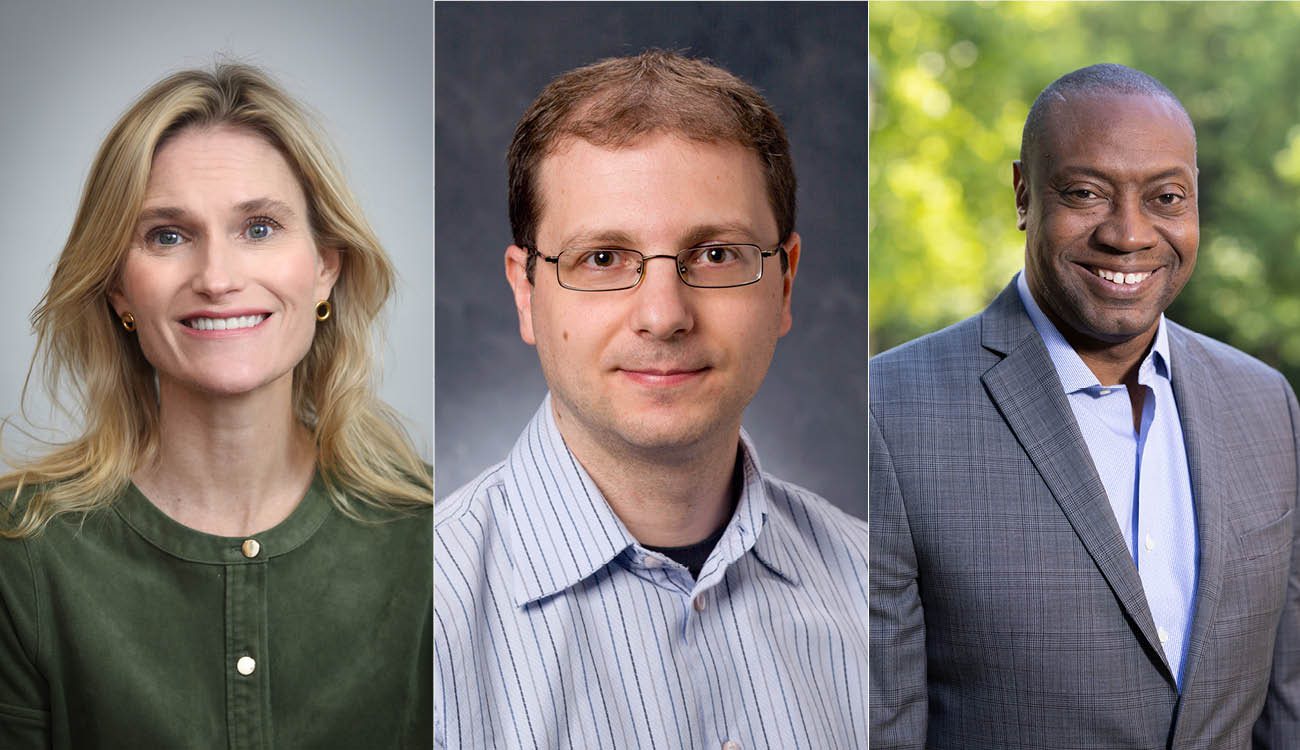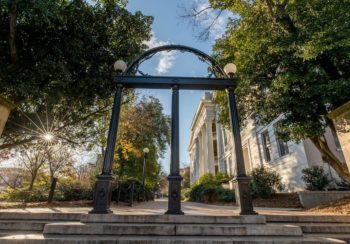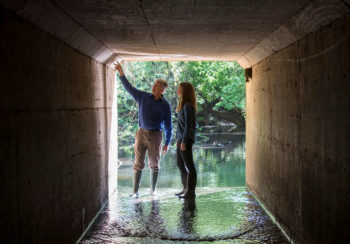Ten university-wide projects devoted to advancing interdisciplinary research across multiple application areas have been awarded Presidential Interdisciplinary Seed Grants as part of the 2023 cohort.
The Presidential Interdisciplinary Seed Grant Program was launched in 2017 and offered again in 2019 and 2021 through a partnership between the offices of Research and Public Service and Outreach. Its success is reflected by the value of external grants subsequently won by teams to pursue work initiated through these seed grants. These 10 awards were chosen from 70 proposals and reflect a commitment of $1 million from UGA President Jere W. Morehead.
For the first time, this year’s program has two tracks: New Frontiers and Cluster Engagement. The New Frontiers track is intended to support early-stage exploration of potentially transformative research that addresses grand challenges at the community, state, national, or global level.
Marshall Shepherd leads one New Frontiers project, incorporating researchers from atmospheric sciences, geography, planning, and engineering. The project is a collaboration with industry partners to mitigate urban heat stress on both citizens and infrastructure. In addition to UGA researchers, the project will feature partnerships with The Ray, Pirelli Tires, and ESRI, a developer of geographic information software.
“I have been on previous Presidential Interdisciplinary Seed Grant projects and am always stimulated by how they change the rules of engagement in a positive way,” said Shepherd, a Georgia Athletics Distinguished Professor in the Franklin College of Arts and Sciences Department of Geography. “Challenges within society are not in silos, so the solution space should not be either.”
Carl Vinson Institute of Government Associate Director Shana Jones also is leading a New Frontiers project that establishes UGA as a testbed for electric vehicle implementation and to inform both academic and applied research by establishing EV adoption and infrastructure on campus.
Partnering with researchers in the Terry College of Business and College of Engineering, Jones and her team plan to create key data sources and establish foundational metrics to increase overall EV usage and accessibility across the state.
“Interdisciplinary research spurs creativity and innovation. Problems are multi-faceted, requiring multiple methods, ideas, perspectives, and goals,” Jones said. “Leveraging expertise across disciplines multiplies impact.”
The Cluster Engagement track is devoted to addressing one or more themes of the 10 interdisciplinary clusters of the Presidential Interdisciplinary Faculty Hiring Initiative in Data Science and Artificial Intelligence. Consistent with UGA’s 2025 Strategic Plan goals, successful seed projects will lay the foundation for creation of an ecosystem that connects research, innovation, entrepreneurship, and partnerships with communities.
Each of the Cluster Engagement Awarded teams have at least one cluster hire, including two that are led by AI/data sci cluster hires.
Roberto Perdisci, a professor in the School of Computing, is the principal investigator for a project addressing AI-generated deepfakes and possible socio-technical solutions. The term “deepfake” refers to realistic AI-generated images, videos, or audio that can be used to create fake but believable content and thus mislead humans.
While the AI technology behind deepfakes can have legitimate uses, such as in the entertainment industry, it can also be used maliciously to manipulate perceptions of real-world facts, such as in cyber-warfare, election manipulation, and misinformation/disinformation campaigns on social media.
“Deepfakes can pose serious risks to society overall. Without a reliable solution, they might allow anyone to reject or discredit real events reported by the news media as fake,” Perdisci said. “It is critical to investigate how humans perceive digital media and how the results of detection systems can be effectively communicated to empower them to make better informed decisions. Similarly, any solution to this problem will need to be implemented within—and supported by—regulatory frameworks and laws.”
Perdisci’s team is made up of experts in AI, cybersecurity, journalism, public policy, and law.
Full listing: 2023 Presidential Interdisciplinary Seed Grant projects
“From Bench to Bed Net: Developing Novel Antimalarial Inhibitors for Killing Plasmodium in the Malaria Mosquito.” Douglas Paton (primary investigator, College of Veterinary Medicine: Department of Infectious Disease); Chester Joyner (Center for Tropical and Emerging Global Diseases); Pejman Rohani (Odum School of Ecology).
“Developing Applied Institutional Ethics for the Age of AI: Interdisciplinary Approaches.” Youjin Kong (primary investigator, Franklin College of Arts and Sciences: Department of Philosophy); L. Jason Anastasopoulos (School of Public and International Affairs); Jeremy Davis (Franklin College of Arts and Sciences: Department of Philosophy); Prasant Doshi (School of Computing); Matthew I. Hall (School of Law); Akshat Lakhiwal (Terry College of Business); Aaron Schecter (Terry College of Business); Ari Schlesinger (School of Computing); Christian Turner (School of Law).
“Using Precision Agriculture Technologies to Improve Pest Diagnosis and Spray Application to Address Pest Challenges Facing Key Fruit Crops in Georgia.” Ashfaq Sial (primary investigator, College of Agricultural and Environmental Sciences: Department of Entomology); Glen Rains and Brett Blaauw (College of Agricultural and Environmental Sciences: Department of Entomology); Phillip Brannen, Md Sultan Mahmud, and Jonathan Oliver (College of Agricultural and Environmental Sciences: Department of Plant Pathology); Guoyu Lu (School of Computing); Simerjeet Virk (College of Agricultural and Environmental Sciences: Department of Crop and Soil Sciences).
“PCP HELPR: Primary Care Provider Healthcare Extension by Leveraging Pharmacists in Rural Communities through Telehealth Technologies.” Devin Lavender (primary investigator, College of Pharmacy); Rebecca Stone, Beth Phillips, Blake Johnson, Chelsea Keedy, Sharmon Osae, Russell Palmer, and Henry Young (College of Pharmacy); Daniel Jung (College of Public Health); Daniel Hall (Franklin College of Arts and Sciences: Department of Statistics); and external collaborators.
“Reimagining Sustainability: Pioneering Upcycled Foods in Circular Food Systems.” Peng Lu (primary investigator, College of Agricultural and Environmental Sciences: Department of Agricultural Leadership, Education, and Communication); Alexa Lam (College of Pharmacy); Jiyong Park (Terry College of Business); James Gratzek (College of Agricultural and Environmental Sciences: Food Product Innovation and Commercialization Center); Abigail Borron(College of Agricultural and Environmental Sciences: Department of Agricultural Leadership, Education, and Communication); and external collaborators.
“Turning Blue to Green: Economic Development and Investment from Aquaculture in Georgia.” Mark Risse (primary investigator, director, UGA Marine Extension and Georgia Sea Grant); Amrit Bart (College of Agricultural and Environmental Sciences: Department of Animal and Dairy Science); Daniel Remar (College of Agricultural and Environmental Sciences: Agricultural and Applied Sciences); James Shelton (Warnell School of Forestry and Natural Resources); Issmat Kassem (Center for Food Safety); Thomas Bliss, Bryan Fluech, and Eugene Frimpong (UGA Marine Extension and Georgia Sea Grant).
“Healing and Empowerment after Limb Loss in XR.” Kyle Johnsen (primary investigator, School of Electrical and Computer Engineering); Grace Ahn (Grady College of Journalism and Mass Communication); Fred Beyette (College of Engineering); Deborah Barany (Mary Frances Early College of Education); Ted Furtis (UGA Cooperative Extension, College of Family and Consumer Sciences).
“Socio-Technical Solutions for Countering AI-Generated Deep Fakes.” Roberto Perdisci (primary investigator, School of Computing); Jin Sun (School of Computing); Le Guan (School of Computing); Justin Conrad (School of Public and International Affairs); Sonja West and Thomas Kadri (School of Law); Bartosz Wojdynski (Grady College of Journalism and Mass Communication); Mark Lupo (Carl Vinson Institute of Government).
“Leading Georgia’s E-Mobility Innovation: Informing Research and Decision-Making.” Shana Jones (primary investigator, Carl Vinson Institute of Government); Don Leo, Fred Beyette, and Tianqi Hong (College of Engineering); Gerald Kane, Maric Boudreau, Jiyong Park, and John Rios (Terry College of Business); Justin Ellis (Office of Sustainability); Natalie Bock (Carl Vinson Institute of Government).
“Rubber-Modified Asphalt- A Potential Urban Heat Island Mitigation Strategy.” Marshall Shepherd (primary investigator, Franklin College of Arts and Sciences: Department of Geography); Brian Bledsoe (Institute for Resilient Infrastructure Systems); Rosanna Rivero (College of Environment and Design); Andrew Grundstein and Sergio Bernardes(Franklin College of Arts and Sciences: Department of Geography); Christina Fuller (College of Engineering).






